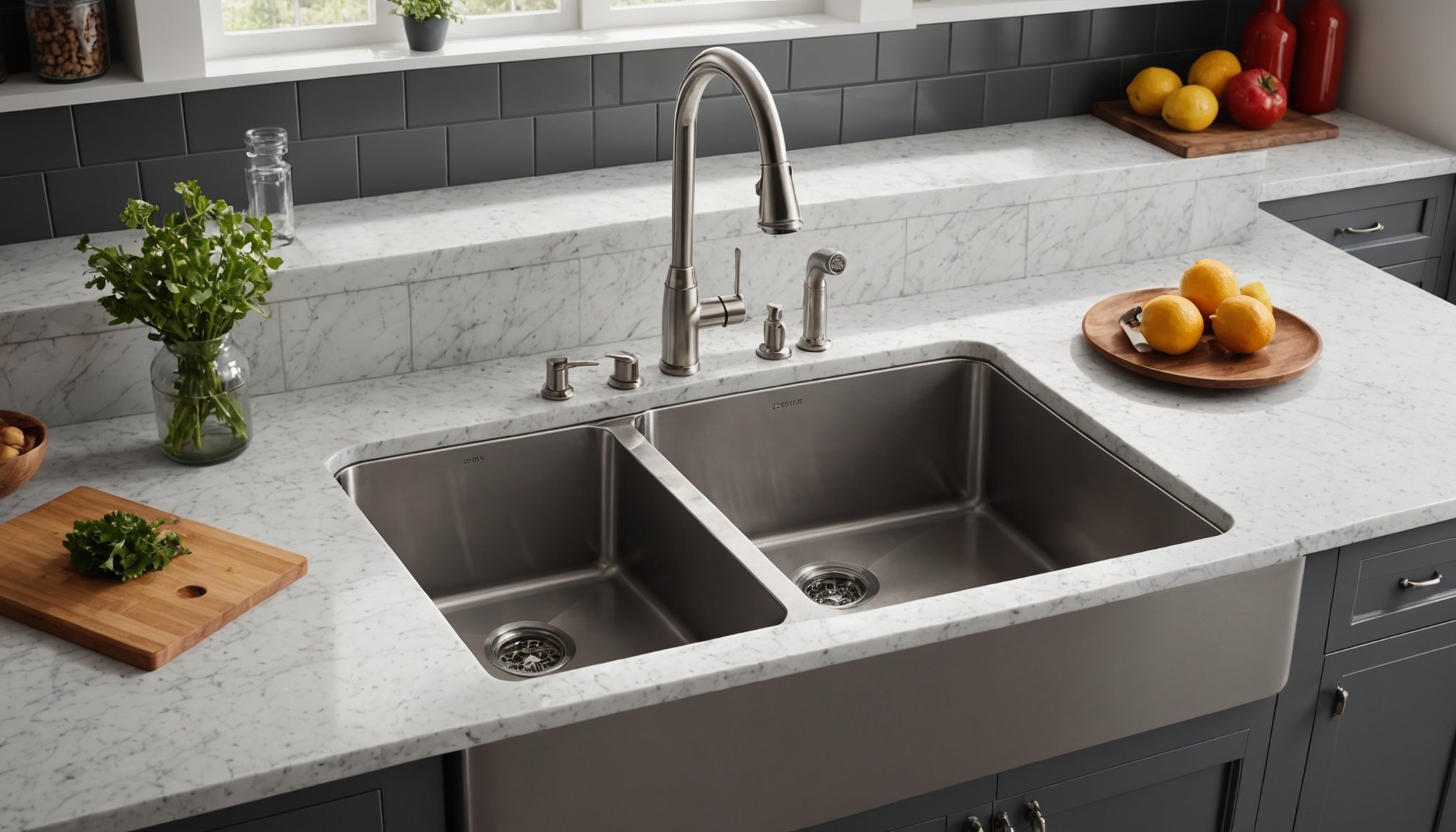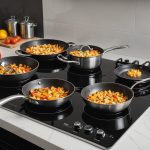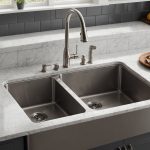Choosing the right kitchen sink material can significantly impact your cooking space, influencing both aesthetics and functionality. With an abundance of options, it’s essential to weigh factors like durability and ease of cleaning. This guide explores top materials, from stainless steel to composite, helping you make an informed decision that suits your lifestyle and enhances your kitchen's charm. Discover which sink options stand the test of time and simplify your daily routine. Your perfect kitchen sink awaits!
Overview of Kitchen Sink Materials
Exploring the essentials of kitchen sink options and material selection.
This might interest you : Essential Factors to Evaluate When Selecting the Perfect High-Quality BBQ Grill for Your Backyard Culinary Adventures
Choosing the right kitchen sink material is crucial for both functionality and aesthetics. Various sink options are available, each with unique characteristics that cater to different needs. Understanding these differences can help in making an informed decision.
Common Materials
- Stainless Steel: Known for its durability and resistance to stains and heat. It is a popular choice for modern kitchens.
- Cast Iron: Offers a classic look with a durable enamel finish, but can be prone to chipping.
- Granite Composite: Provides a sleek, contemporary appearance and is resistant to scratches and stains.
- Fireclay: Known for its glossy finish and resistance to chips and scratches, adding a traditional touch.
Factors Influencing Material Selection
When selecting a kitchen sink material, consider factors such as functionality, maintenance, and how the material complements your kitchen's style. For instance, stainless steel sinks are ideal for busy kitchens due to their easy maintenance. In contrast, granite composite sinks offer a sophisticated look with minimal upkeep.
Also to discover : Explore delicious cassoulet varieties for cozy dinners
"The kitchen sink is the heart of the kitchen, where functionality meets design." This quote emphasizes the importance of selecting the right material to enhance both the practical and aesthetic aspects of your kitchen space.
Stainless Steel Sinks
Understanding the resilience and upkeep of stainless steel kitchen sinks.
Benefits of Stainless Steel Sinks
Stainless steel kitchen sinks are renowned for their durability and resistance to stains. These sinks are highly favored in both residential and commercial kitchens due to their robust nature. The material's ability to withstand heat and resist corrosion makes it a practical choice for any kitchen environment. Additionally, stainless steel's sleek appearance complements various kitchen styles, enhancing both functionality and design.
Maintenance Tips for Stainless Steel Sinks
Maintaining a stainless steel kitchen sink is straightforward. Regular cleaning with mild soap and water keeps it looking pristine. For tougher stains, a mixture of baking soda and water can be used as a gentle scrub. It's crucial to avoid harsh chemicals or abrasive materials, which can scratch the surface. Drying the sink after use prevents water spots and maintains its shine.
Gauge Thickness and Quality
The gauge thickness of a stainless steel kitchen sink significantly impacts its quality. A lower gauge number indicates a thicker and more durable sink. Typically, gauges range from 16 to 22, with 16 being the thickest and most durable. Thicker gauges offer better sound insulation and less susceptibility to dents, ensuring long-term satisfaction.
"A kitchen sink's quality is measured by its gauge."
Porcelain Sinks
Exploring the elegance and maintenance of porcelain kitchen sinks.
Advantages of Porcelain Sinks
Porcelain kitchen sinks are celebrated for their classic look and smooth surface. These sinks bring an elegant touch to any kitchen, seamlessly blending with various design styles. The aesthetic appeal of porcelain is unmatched, offering a timeless charm that elevates kitchen decor. Additionally, their smooth surface ensures easy cleaning, making them a practical choice for those who value both beauty and functionality.
Potential Drawbacks
While porcelain sinks boast many advantages, they are not without potential issues. Chipping and staining are common concerns. The material, though durable, can chip if heavy objects are dropped onto it. Staining can also occur, particularly with prolonged exposure to certain liquids. However, these issues can be mitigated with proper care and maintenance.
Best Cleaning Practices
To maintain the aesthetic appeal of a porcelain kitchen sink, regular cleaning is essential. Use a mild, non-abrasive cleaner to avoid scratching the surface. For stubborn stains, a paste of baking soda and water can be effective. Avoid harsh chemicals that may damage the finish. Consistent care will ensure your porcelain sink remains a stunning centerpiece in your kitchen.
Granite Composite Sinks
Evaluating the strength and style of granite composite kitchen sinks.
Overview of Granite Composite Materials
Granite composite kitchen sinks are crafted from a blend of granite stone dust and acrylic resins. This combination results in a highly durable and versatile sink option. Granite composite sinks are resistant to scratches, stains, and heat, making them an excellent choice for busy kitchens. Their non-porous surface also prevents bacterial growth, ensuring a hygienic kitchen environment.
Maintenance Requirements and Cleaning Tips
Maintaining a granite composite kitchen sink is straightforward. Regular cleaning with mild soap and water keeps the surface pristine. For more stubborn stains, a mixture of baking soda and water can be used. It's important to avoid harsh chemicals that could damage the finish. Drying the sink after use helps maintain its durability and appearance.
Design Versatility and Color Options
The design versatility of granite composite kitchen sinks is one of their most appealing features. Available in a range of colors, these sinks can complement any kitchen style, from traditional to contemporary. Popular color options include black, white, and grey, allowing homeowners to customize their kitchen's look.
"Granite composite sinks offer the perfect blend of style and strength."
Cast Iron Sinks
Exploring the unique features and care requirements of cast iron kitchen sinks.
Features of Cast Iron Sinks
Cast iron kitchen sinks are renowned for their heat retention and durability. These sinks maintain the water temperature longer than other materials, making them ideal for tasks requiring warm water. The robust nature of cast iron ensures a long lifespan, providing a classic aesthetic that withstands the test of time. However, their substantial weight can pose challenges during installation, often requiring reinforced cabinetry.
Care Instructions
Proper care is essential to prevent chipping and scratching of a cast iron kitchen sink. To maintain its glossy enamel finish, use a soft cloth or sponge with a non-abrasive cleaner. Avoid dropping heavy objects into the sink to minimize the risk of damage. Regularly drying the sink helps preserve its appearance and prevents mineral deposits.
Comparison with Other Materials
When comparing cast iron sinks to other materials, consider factors such as weight and installation. Unlike stainless steel or granite composite, cast iron is significantly heavier, necessitating professional installation. However, its heat retention and timeless appeal often outweigh these considerations for those seeking a traditional kitchen centerpiece.
"A cast iron sink's charm lies in its enduring strength and classic elegance."
Fireclay Sinks
Exploring the crafted elegance and resilience of fireclay kitchen sinks.
Introduction to Fireclay Sinks
Fireclay kitchen sinks are celebrated for their handcrafted charm and remarkable durability. Made by molding clay at high temperatures, these sinks offer a unique aesthetic that blends seamlessly into traditional and modern kitchen designs. The handcrafted nature of fireclay sinks ensures each piece has its own distinct character, adding a touch of individuality to your kitchen space.
Advantages of Fireclay Sinks
- Handcrafted Appeal: Each fireclay sink is meticulously crafted, offering a bespoke feel.
- Long-lasting Durability: The material is resistant to chips and scratches, ensuring longevity.
- Heat and Stain Resistance: Fireclay's robust nature withstands high temperatures and resists stains.
Maintenance Tips and Common Issues
Maintaining a fireclay kitchen sink is relatively straightforward. Regular cleaning with mild soap and water is recommended to preserve its durability. Avoid abrasive cleaners to prevent surface damage. While fireclay is generally resistant to chipping, heavy impacts should be avoided to maintain its integrity. Addressing minor stains promptly with a baking soda paste can help maintain the sink's pristine appearance.
"The beauty of a fireclay sink lies in its handcrafted artistry and enduring strength."
Composite Sinks
Exploring the diversity and benefits of composite kitchen sinks.
Overview of Composite Sink Types
Composite kitchen sinks offer a variety of types, each designed to cater to different preferences and kitchen styles. These sinks are typically made from a combination of materials such as quartz, granite, and acrylic resins. This blend results in a durable and versatile product that withstands daily kitchen activities. The affordability of composite sinks makes them an attractive option for homeowners seeking both quality and cost-effectiveness.
Cost-Effectiveness and Maintenance
One of the standout features of composite kitchen sinks is their affordability. They provide a high-end look without the high-end price tag. In terms of maintenance, these sinks are relatively easy to care for. Regular cleaning with mild soap and water keeps them in excellent condition. Their non-porous surface resists stains and bacterial growth, ensuring a hygienic kitchen environment.
Aesthetic Appeal and Customization
The aesthetic appeal of composite kitchen sinks is undeniable. Available in a range of colors and finishes, they can be customized to match any kitchen decor. Popular color options include black, white, and beige, offering flexibility in design. This customization allows homeowners to create a cohesive kitchen look that aligns with their personal style.
- Durability: Resistant to scratches and stains
- Versatility: Complements various kitchen styles
- Customization: Wide range of color options
User Testimonials and Expert Recommendations
Exploring real-world experiences and professional insights on kitchen sinks.
User Experiences with Different Sink Materials
Many users have shared their experiences with various kitchen sink materials, highlighting both strengths and weaknesses. Stainless steel sinks are often praised for their practicality and easy maintenance. In contrast, users of porcelain sinks appreciate their classic look but note concerns about chipping. Granite composite sinks receive accolades for their durability and style, while cast iron sinks are favored for their heat retention and timeless appeal.
Expert Advice on Choosing the Right Sink
Experts emphasize the importance of aligning sink choices with lifestyle needs. For example, a stainless steel sink is recommended for busy households due to its resilience. Granite composite sinks are advised for those seeking a blend of style and strength. Fireclay sinks, with their handcrafted charm, are ideal for those prioritizing aesthetics.
Recommended Materials Based on Lifestyle
- Active Kitchens: Stainless steel for durability
- Aesthetic Focus: Fireclay for unique charm
- Low Maintenance: Granite composite for easy care
"Choosing the right kitchen sink material can transform your kitchen experience." Experts suggest considering factors like maintenance, style, and functionality to make an informed decision.
Conclusion and Decision-Making Tips
Providing practical advice for your kitchen sink selection journey.
Key Takeaways for Kitchen Sink Selection
Selecting the best kitchen sink material involves understanding your specific needs and preferences. Consider factors such as durability, aesthetic appeal, and maintenance requirements. Each material has unique benefits: stainless steel offers resilience, granite composite provides style and strength, and fireclay adds handcrafted charm.
Evaluating Personal Needs and Preferences
Before making a decision, evaluate your kitchen habits and design preferences. Here's a checklist to guide your decision-making:
- Usage Frequency: How often is the sink used?
- Maintenance: Are you willing to commit to regular upkeep?
- Style Preference: Do you prefer a modern or traditional look?
- Budget: What is your price range?
Resources for Further Research
To make an informed decision, consult resources like kitchen design magazines, online forums, and professional advice from interior designers. These resources can provide insights into the latest trends and expert recommendations, ensuring your kitchen sink selection aligns with your lifestyle.
"The right kitchen sink material can enhance both functionality and aesthetics." This decision is crucial for creating a kitchen space that meets your practical needs while reflecting your personal style.













